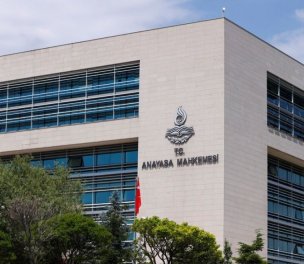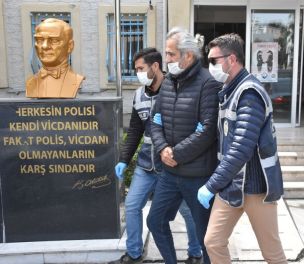* Photo: Anadolu Agency (AA) / Archive
Click to read the article in Turkish / Kurdish
The Constitutional Court has announced its ruling on journalist Hakan Aygün, who was arrested for more than a month over a tweet. The top court has concluded that the journalist's rights were violated.
CLICK - Arrested Over a Tweet, Journalist Aygün Released
Journalist Hakan Aygün was arrested on April 3, 2020 over his tweets on a fundraising campaign launched by President and ruling AKP Chair Recep Tayyip Erdoğan to fight the coronavirus pandemic.
Erdoğan had asked citizens to put money into a bank account, giving an international bank account number (IBAN).
In a tweet he posted on March 31, Aygün made a wordplay on IBAN and "iman," which means "faith" in Turkish and mostly used in a religious manner. He wrote about an imaginary "IBAN section" of Quran, saying those who "IBAN" and those who "don't IBAN" would be "separated in afterlife."
Charged with "provoking the public to hatred and hostility" as per the Article 216 of the Turkish Penal Code (TCK), journalist Hakan Aygün was released at his first hearing on May 6, 2020.
'Incompliance with legality of crimes'
The Constitutional Court has examined the imprisonment of the journalist over his social media post. In its ruling, the Court has referred to the previous judgements of the Constitutional Court, Court of Cassation and European Court of Human Rights (ECtHR).
The ruling of the top court has emphasized that the provocations that do not tend to provoke the differences set by legal boundaries, do not involve calls for violence or hate speech or reach a level of concrete and imminent danger would not comply with the principle of legality of crimes.
Noting that Hakan Aygün's posts have a tone otherizing certain segments of the society and even degrading them, the Constitutional Court has stressed that "it still does not seem possible to say that the related posts have an aspect provoking a segment of the society, based on at least one of the differences of social class, race, religion, sect or region, to hatred and hostility against another segment of society."
'Investigation not adequately conducted'
The Court has also concluded that Aygün, in his posts, did not use any expressions that could be associated with violence, adding that the element of imminent danger, an essential element for bringing the related charge, was not adequately put forward by the investigative authorities.
"The ways in which the related post posed an imminent danger to public order was not indicated in the investigation documents," it has said.
"Within this context, the investigative authorities mentioned that these posts were liked by several people on social media; however, it is not possible to consider it to be a situation concretely jeopardizing public peace in any way," the Constitutional Court has added.
Referring to the related rulings of the Court of Cassation, the Court has said that "there was no concrete finding as to what kind of interaction and mobilization the applicant's posts caused in masses."
Accordingly, the top court has concluded that there was "no strong specification as to the committal of the crime that would require arrest on charge of provoking the public to hatred and hostility."
Non-pecuniary damages
The Constitutional Court has concluded that the right to personal liberty and security of journalist Hakan Aygün has been violated by the fact that his arrest was not lawful. The Court has unanimously ruled that Aygün shall be paid 40 thousand lira in non-pecuniary damages.
Noting that the trial of Hakan Aygün is still ongoing at the local court, the Constitutional Court has concluded that there is no need to examine his complaint about the violation of freedom of expression.
What happened?
Journalist Hakan Aygün was arrested on April 3, 2020 over his tweets on a fundraising campaign launched by President and ruling AKP Chair Recep Tayyip Erdoğan to fight the coronavirus pandemic.
Erdoğan had asked citizens to put money into a bank account, giving an international bank account number (IBAN).
In a tweet he posted on March 31, Aygün made a wordplay on IBAN and "iman," which means "faith" in Turkish and mostly used in a religious manner. He wrote about an imaginary "IBAN section" of Quran, saying those who "IBAN" and those who "don't IBAN" would be "separated in the afterlife."
In another tweet on April 2, he said he did not originally write the message but tweeted it after it was sent to him.
Following a criminal complaint to İstanbul Chief Public Prosecutor's Office, Hakan Aygün was taken into custody in the western Muğla province. A penal court of peace remanded him in custody on the same day for "provoking people into enmity and hatred" and "insult."
Mustafa Doğan, an attorney who filed the complaint against Aygün, had claimed that the tweets Aygün posted after President Erdoğan's campaign exceeded the limits of criticism and were humiliating, unrealistic and encouraging criminal activities.
At his first hearing on May 6, 2020, Aygün was released by the Bodrum 3rd Penal Court of First Instance. (HA/SD)




.jpg)



